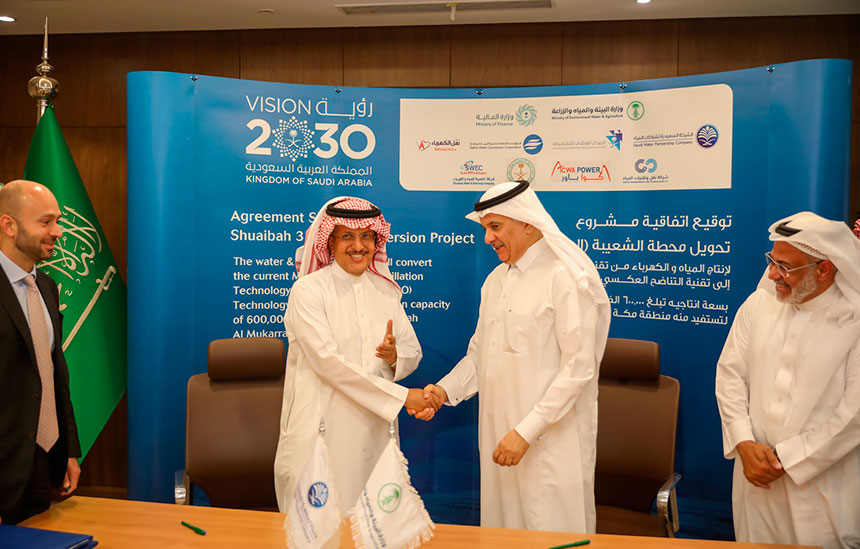His Excellency the Minister of Environment, Water and Agriculture, & Chairman of the Board Directors of Saudi Water Partnership Company Eng. Abdulrahman bin Abdulmohsen AlFadley, signed today June 20, 2022 the Project agreements of Shuaibah-3 IWPP Conversion Project, from Multi-stage Flash “MSF” technique to Reverse Osmosis “RO” technique, which will be built in Shuaibah in Makkah Province with a Potable Water production capacity of 600,000 m3/day.
Eng. Al-Fadley explained that the signing of these agreements helps in implementing the decisions of the Council of Ministers and achieving the goals of the Ministry to showcase water production and wastewater treatment projects to investors. In addition, the signing further enhances the active participation of the private sector in developing this vital Water sector and increasing its contribution to the Kingdom’s development. Whereas, the allocation of these Projects under the Environment, Water and Agriculture structure accomplish the goals of Kingdom’s 2030 vision, the Privatization programs improves the quality of services and the efficiency of capital spending, by utilizing the experiences of the Private sector’s participation. Eng. Al-Fadley explained the importance of the project as it serves Makkah province, and that the conversion process will contribute to increasing the sustainability and reliability of water supply. He also added that this conversion will contribute to saving the fuel consumed in operating the current plant. His Excellency also referred to His Highness the Crown Prince’s announcement to achieve net carbon neutrality by 2060 through the circular economy approach to carbon, thus this project will achieve a reduction of carbon emissions, and that converting Shuaibah-3 project is a precedent of its kind in converting a project with existing agreements.
On his part, the CEO of the Saudi Water Partnership Company, Eng. Khalid Bin Zwaid Al-Qureshi stated that the conversion process will be with BOO (Build, Own and Operate) approach. He added that the consortium that will develop the project comprising Badel owned by Public Investment Fund “PIF” and ACWA Power and will be using “Reverse Osmosis” technology. This strategic project will also include solar energy units to reduce the electricity consumption from the grid and contributing to supplying 45% of the electricity needs of the Project. Mr. Al-Qureshi added that the conversion process will contribute to economic, financial, technical and environmental benefits represented in saving the consumed fuel to operate the current plant, where more than 22 million barrels of light crude oil will be saved annually, and will also contribute to reducing the percentage of carbon emissions to zero carbon emissions as the new plant will operate with environmentally friendly technology. Mr. Al-Qureshi said that the Project Commercial Operation Date will be in the second quarter of 2025, and that the Project term of the concession agreement is 25 years, and it will contribute to achieving high levels of continuous production, lower levels of specific electric energy consumption and operating costs. Moreover, in addition to supporting local content by increasing the percentage of localization and Saudization. The agreements which were signed today at His Excellency the Minister’s office are part of the Public Private Partnerships (PPP) that the Ministry of Environment, Water and Agriculture intends to present to investors, and the supervisory committee to allocate the environment, water, and agriculture sector during the past months has completed developing a strategy to allocate the sector in line with the goals of “Vision 2030”.
The CEO of the National Center for Privatization, a member of the Board of Directors of the Saudi Water Partnership Company, Mr. Mohannad Basodan, pointed out that it is a great effort to establish a system of partnership between the public and private sectors and the application of international best practices, noting that the center sets the standards, frameworks, and legislation for the partnership between the public and private sectors. He added that contracts for a number of projects have been signed in several sectors, with most of them under the Ministry of Environment, Water and Agriculture, and that the Kingdom is steadfastly moving towards implementing the Saudi Vision 2030, and we have confidence in reaching what we aspire by 2030 to diversify the national economy and generate more job opportunities for Saudi nationals and attain the highest level of local content.
Mr. Basodan concluded that the local content requirements for this project will reach 40% in the construction phase and 50% during the first five years of operation and increases to 70% during the remaining years.




